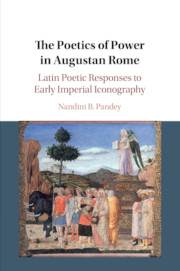
-
Select format
-
- Publisher:
- Cambridge University Press
- Publication date:
- September 2018
- October 2018
- ISBN:
- 9781108525152
- 9781108422659
- 9781108435635
- Dimensions:
- (228 x 152 mm)
- Weight & Pages:
- 0.64kg, 314 Pages
- Dimensions:
- (229 x 152 mm)
- Weight & Pages:
- 0.46kg, 318 Pages
You may already have access via personal or institutional login
Book description
Augustus' success in implementing monarchical rule at Rome is often attributed to innovations in the symbolic language of power, from the star marking Julius Caesar's deification to buildings like the Palatine complex and the Forum Augustum to rituals including triumphs and funerals. This book illuminates Roman subjects' vital role in creating and critiquing these images, in keeping with the Augustan poets' sustained exploration of audiences' active part in constructing verbal and visual meaning. From Vergil to Ovid, these poets publicly interpret, debate, and disrupt Rome's evolving political iconography, reclaiming it as the common property of an imagined republic of readers. In showing how these poets used reading as a metaphor for the mutual constitution of Augustan authority and a means of exercising interpretive libertas under the principate, this book offers a holistic new vision of Roman imperial power and its representation that will stimulate scholars and students alike.
Contents
Metrics
Altmetric attention score
Full text views
Full text views help Loading metrics...
Loading metrics...
* Views captured on Cambridge Core between #date#. This data will be updated every 24 hours.
Usage data cannot currently be displayed.
Accessibility standard: Unknown
Why this information is here
This section outlines the accessibility features of this content - including support for screen readers, full keyboard navigation and high-contrast display options. This may not be relevant for you.
Accessibility Information
Accessibility compliance for the PDF of this book is currently unknown and may be updated in the future.


